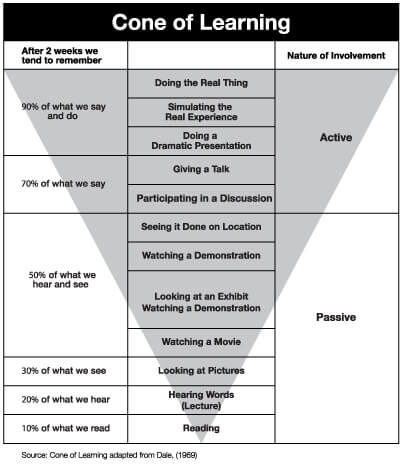Blog | Personal Finance
Use the Power of Play to Escape the Rat Race
Get out of the Rat Race game by playing games that increase financial IQ
Rich Dad Personal Finance Team
June 29, 2023
Summary
-
Traditional methods of teaching go against the natural way in which humans are meant to learn
-
There have been proven results in the power of play when it comes to learning
-
The best way to learn how to get out of the Rat Race is by playing the educational board game, CASHFLOW®
In 1996, Robert Kiyosaki’s educational board game, CASHFLOW®, was submitted to a group of instructors at a prominent university for their feedback. Their verbal reply was, “We do not play games in school, and we are not interested in teaching young people about money. They have more important subjects to learn.” Clearly, they didn’t understand the power of play.
Sadly, this is still the way many educators and parents across the world respond to the idea of children playing in order to learn. In an article published by Quartz on the importance of play in learning and an experiment with play labs in Bangladesh, you can find the following quotes:
-
“There’s a preconception that from the early years [children] are led into a world of textbooks, and there’s no room for them to play.”
-
“Parents were not receptive. ‘What’s the point of this’ and ‘What’s the use of play?’ were common refrains…”
-
“I’d rather do housework than waste my time with play…”
Unsurprisingly, these aren’t uncommon comments that may be heard when preaching the importance of play as the most important way to learn, better than books, lectures, and tests.


In the Rat Race there’s no room for play
What would lead so many adults to be so afraid of play?
In his book, Rich Dad Poor Dad, Robert writes about the concept of the Rat Race. In short, it’s the vicious cycle we learn from a young age that the only way to get ahead is to go to a good school, get a good job, and work harder and harder to try and get ahead. Unfortunately, the Rat Race game is a losing one.
The reason for this is because the Rat Race makes you entirely dependent on other people: your parents, your teachers, your boss, etc. And it completely shuts off your mind from other possibilities and ways of living and thriving in the world.
In the Rat Race, you rely on other people to mind your business for you. And, as we can see from the example of those play labs in Bangladesh, those people often do not want you to play or have fun. They want you to work, work, work as hard as you can.
Unfortunately, what they’re missing (or in some cases trying to block) is that the power of play is exactly what unlocks the ability for anyone to achieve their fullest potential.
The power of play to break free from the Rat Race of life
A number of years ago, Arizona State University, another prominent university, also evaluated our CASHFLOW Game. Unlike the university that didn’t have time for games and didn’t want to teach kids about money, ASU found that CASHFLOW was a great tool. In fact, they said that Robert Kiyosaki’s game, CAHSFLOW, was “the closest simulation of the real thing.”
Those words are important because they map to an important development in education by Profesor Edgar Dale called “The Cone of Learning.”

Dale’s Cone of Learning divided education into two areas, passive and active. According to Dale, the worst ways to learn something were passively, such as reading, lectures, etc. The best way to learn was to do so actively. The top active learning activity is doing the real thing. But just below that is simulating the real experiences.
Enter: the power of play.
This is why ASU saying that CASHFLOW the Board Game is “the closest simulation of the real thing,” is so important.
If you want to break out of the Rat Race of life, the best way to increase your financial education is to play and then do. CASHFLOW the Board Game is designed to help you play over and over again, learn from your mistakes, and be ready to start investing in real life. It is designed to help you break free from the Rat Race and experience financial freedom.
Break out of the Rat Race by doing, not thinking
There is a growing mountain of evidence supporting Dale’s claim through the Cone of Learning that we learn best by doing, such as playing games, rather than by listening and reading (lectures and books).


As Gabe Zichermann says in his excellent TED Talk, Changing the Game in Education, “Humans are doing machines. We do. That’s our nature…and it turns out there’s a core biological reason why we do, and it’s an amazing little neurotransmitter called dopamine.”
Zichermann talks about how the modern education system is fundamentally opposed to our nature as humans. Asking us to sit down and pay attention does very little for our education, when in reality we learn more by trying, making mistakes, and achieving. Experiencing the chemical benefits of the pleasure we feel when dopamine is released through our achievements helps us remember and learn far more efficiently.
He then goes on to make the case for why gamification is the future of education—including an amazing example of a teacher using Monopoly at a school in California’s Inland Empire to teach kids about money, among other things. The result: a jump of 40 kids in the top rankings of the California Math Test, up from less than 10 at the start of the program.
It’s worth a watch.
The benefits of learning from play
The power of play is evident in the benefits derived from it. In Bangladesh, where play labs are slowly growing to become a part of the formation of young children, teachers and parents alike are changing their mindset about what it means to educate children.
-
Over the course of visits to five play labs in Bangladesh, play leaders engaged the children with clucks, coos, and laughter, while also letting them be. And during free play, the kids managed conflicts well. When one girl named Moni asked a young boy to move so she could swing across the room on a satin cloth, he refused. She asked again. He was busy stacking blocks. And so Moni decided to move her launch pad, a bamboo stool, in order to avoid him. No one intervened in this exchange; many observed it. This is a radically different approach in a country where many still believe that the best learning happens when kids sit still and follow directions.
-
“I am not a teacher, I am a play lab leader,” said Tania, who works at the Begunbari play lab in the suburbs of Dhaka. “If I am a teacher I am saying ‘do this’ and telling them what to do. I don’t give them exercise books, I just let them play.”
Contained in the simple statement, “I am not a teacher, I am a play lab leader,” is great wisdom. The difference between telling kids what to do versus letting them learn from doing, including making mistakes, is the difference between creating sub-servient employees and innovative entrepreneurial thinkers.
This is the philosophical foundation of CASHFLOW the Board Game, of Dale’s Cone of Learning, of Zichermann’s take on education: play is the key to unlocking human potential and breaking free of the Rat Race.
Rich Dad’s mission is to help you play and break free from the Rat Race
In many cases, it’s the marketplace, not school, that is filling the void of this need for humans to learn by doing. The marketplace does it through games—a method that much of the traditional education system ignores.
This provides an insight to an important rule about business: “Don’t go where you’re not wanted.” In other words, it is easier to make money and to effect change where you’re wanted.
This is the very reason why the CASHFLOW board game was developed. Robert and Kim Kiyosaki believed so much in the power of play to learn, and the demand for that kind of learning, that they decided to make a product that would meet that demand. In fact, they believe so much in the power of play to help people break free from the Rat Race that they’ve made CASHFLOW Classic free to play online.
The good news is that more and more schools have been using these games as teaching products in their classrooms. However, the best news is that the public likes these products. The board games sell well to private individuals—as well as to community organizations, churches, and youth programs. These are people who want to improve financial education for themselves and their members and look to sources outside traditional schools to learn.
It all came full circle when Thunderbird School of Global Management utilized Rich Dad Poor Dad, CASHFLOW Quadrant, and the CASHFLOW games in its curriculum for their entrepreneurship program. The very prestigious university is internationally recognized for its educational programs.


Start playing around more and escape the Rat Race!
At Rich Dad, we are committed to the power of games to change people’s financial lives. We spent a lot of time and resources to turn CASHFLOW into a digital online game that anyone can play for free.
But we didn’t stop there. We’re creating a host of educational apps and games that help you—and your kids—understand how money works and how it can work for you.
Want to grow your and your family’s financial IQ? Start playing more games today.
Original publish date:
December 11, 2018